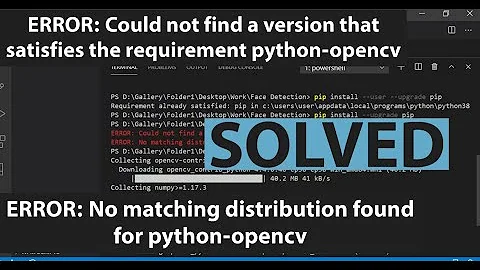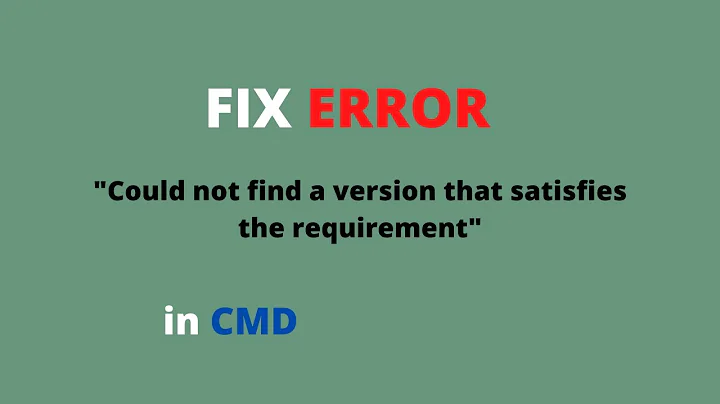Could not find a version that satisfies the requirement <package>
Solution 1
This approach (having all dependencies in a directory and not downloading from an index) only works when the directory contains all packages. The directory should therefore contain all dependencies but also all packages that those dependencies depend on (e.g., six, pytz etc).
You should therefore manually include these in requirements.txt (so that the first step downloads them explicitly) or you should install all packages using PyPI and then pip freeze > requirements.txt to store the list of all packages needed.
Solution 2
I had installed python3 but my python in /usr/bin/python was still the old 2.7 version
This worked (<pkg> was pyserial in my case):
python3 -m pip install <pkg>
Solution 3
Although it doesn't really answers this specific question. Others got the same error message with this mistake.
For those who like me initial forgot the -r: Use pip install -r requirements.txt the -r is essential for the command.
The original answer:
https://stackoverflow.com/a/42876654/10093070
Solution 4
After 2 hours of searching, I found a way to fix it with just one line of command. You need to know the version of the package (Just search up PACKAGE version).
Command:
python3 -m pip install --pre --upgrade PACKAGE==VERSION.VERSION.VERSION
Solution 5
Just a reminder to whom google this error and come here.
Let's say I get this error:
$ python3 example.py
Traceback (most recent call last):
File "example.py", line 7, in <module>
import aalib
ModuleNotFoundError: No module named 'aalib'
Since it mentions aalib, I was thought to try aalib:
$ python3.8 -m pip install aalib
ERROR: Could not find a version that satisfies the requirement aalib (from versions: none)
ERROR: No matching distribution found for aalib
But it actually wrong package name, ensure pip search(service disabled at the time of writing), or google, or search on pypi site to get the accurate package name:
Then install successfully:
$ python3.8 -m pip install python-aalib
Collecting python-aalib
Downloading python-aalib-0.3.2.tar.gz (14 kB)
...
As pip --help stated:
$ python3.8 -m pip --help
...
-v, --verbose Give more output. Option is additive, and can be used up to 3 times.
To have a systematic way to figure out the root causes instead of rely on luck, you can append -vvv option of pip command to see details, e.g.:
$ python3.8 -u -m pip install aalib -vvv
User install by explicit request
Created temporary directory: /tmp/pip-ephem-wheel-cache-b3ghm9eb
Created temporary directory: /tmp/pip-req-tracker-ygwnj94r
Initialized build tracking at /tmp/pip-req-tracker-ygwnj94r
Created build tracker: /tmp/pip-req-tracker-ygwnj94r
Entered build tracker: /tmp/pip-req-tracker-ygwnj94r
Created temporary directory: /tmp/pip-install-jfurrdbb
1 location(s) to search for versions of aalib:
* https://pypi.org/simple/aalib/
Fetching project page and analyzing links: https://pypi.org/simple/aalib/
Getting page https://pypi.org/simple/aalib/
Found index url https://pypi.org/simple
Getting credentials from keyring for https://pypi.org/simple
Getting credentials from keyring for pypi.org
Looking up "https://pypi.org/simple/aalib/" in the cache
Request header has "max_age" as 0, cache bypassed
Starting new HTTPS connection (1): pypi.org:443
https://pypi.org:443 "GET /simple/aalib/ HTTP/1.1" 404 13
[hole] Status code 404 not in (200, 203, 300, 301)
Could not fetch URL https://pypi.org/simple/aalib/: 404 Client Error: Not Found for url: https://pypi.org/simple/aalib/ - skipping
Given no hashes to check 0 links for project 'aalib': discarding no candidates
ERROR: Could not find a version that satisfies the requirement aalib (from versions: none)
Cleaning up...
Removed build tracker: '/tmp/pip-req-tracker-ygwnj94r'
ERROR: No matching distribution found for aalib
Exception information:
Traceback (most recent call last):
File "/usr/lib/python3/dist-packages/pip/_internal/cli/base_command.py", line 186, in _main
status = self.run(options, args)
File "/usr/lib/python3/dist-packages/pip/_internal/commands/install.py", line 357, in run
resolver.resolve(requirement_set)
File "/usr/lib/python3/dist-packages/pip/_internal/legacy_resolve.py", line 177, in resolve
discovered_reqs.extend(self._resolve_one(requirement_set, req))
File "/usr/lib/python3/dist-packages/pip/_internal/legacy_resolve.py", line 333, in _resolve_one
abstract_dist = self._get_abstract_dist_for(req_to_install)
File "/usr/lib/python3/dist-packages/pip/_internal/legacy_resolve.py", line 281, in _get_abstract_dist_for
req.populate_link(self.finder, upgrade_allowed, require_hashes)
File "/usr/lib/python3/dist-packages/pip/_internal/req/req_install.py", line 249, in populate_link
self.link = finder.find_requirement(self, upgrade)
File "/usr/lib/python3/dist-packages/pip/_internal/index/package_finder.py", line 926, in find_requirement
raise DistributionNotFound(
pip._internal.exceptions.DistributionNotFound: No matching distribution found for aalib
From above log, there is pretty obvious the URL https://pypi.org/simple/aalib/ 404 not found. Then you can guess the possible reasons which cause that 404, i.e. wrong package name. Another thing is I can modify relevant python files of pip modules to further debug with above log. To edit .whl file, you can use wheel command to unpack and pack.
Related videos on Youtube
Gabriel
Updated on July 31, 2022Comments
-
 Gabriel almost 2 years
Gabriel almost 2 yearsI'm installing several Python packages in Ubuntu 12.04 using the following
requirements.txtfile:numpy>=1.8.2,<2.0.0 matplotlib>=1.3.1,<2.0.0 scipy>=0.14.0,<1.0.0 astroML>=0.2,<1.0 scikit-learn>=0.14.1,<1.0.0 rpy2>=2.4.3,<3.0.0and these two commands:
$ pip install --download=/tmp -r requirements.txt $ pip install --user --no-index --find-links=/tmp -r requirements.txt(the first one downloads the packages and the second one installs them).
The process is frequently stopped with the error:
Could not find a version that satisfies the requirement <package> (from matplotlib<2.0.0,>=1.3.1->-r requirements.txt (line 2)) (from versions: ) No matching distribution found for <package> (from matplotlib<2.0.0,>=1.3.1->-r requirements.txt (line 2))which I fix manually with:
pip install --user <package>and then run the second
pip installcommand again.But that only works for that particular package. When I run the second
pip installcommand again, the process is stopped now complaining about another required package and I need to repeat the process again, ie: install the new required package manually (with the command above) and then run the secondpip installcommand.So far I've had to manually install
six,pytz,nose, and now it's complaining about needingmock.Is there a way to tell
pipto automatically install all needed dependencies so I don't have to do it manually one by one?Add: This only happens in Ubuntu 12.04 BTW. In Ubuntu 14.04 the
pip installcommands applied on therequirements.txtfile work without issues.-
 James111 almost 8 yearsSometimes your Django project may depend on local brew packages. Double check you have these installed!
James111 almost 8 yearsSometimes your Django project may depend on local brew packages. Double check you have these installed! -
 Derick Daniel about 5 yearsi had the same issue, with 'python -m pip install flask' i was able to install it
Derick Daniel about 5 yearsi had the same issue, with 'python -m pip install flask' i was able to install it -
 Charlie Parker over 2 yearsdid you check the version of python your env is using matches the python reqs of the project? If not it seems you get this error. I fixed it with
Charlie Parker over 2 yearsdid you check the version of python your env is using matches the python reqs of the project? If not it seems you get this error. I fixed it withconda create -n my_anatome_env python=3.9; conda activate my_anatome_envfor example then doing the pip install.
-
-
 Gabriel over 8 yearsSo the only way to find out which all the requirements are is to
Gabriel over 8 yearsSo the only way to find out which all the requirements are is tofreezethe installed packages in a working set up and then add everything in there to therequirements.txtfile? -
Simeon Visser over 8 years@Gabriel: currently yes as many Python packages are installed by running a
setup.pyfile which contains the dependencies that they need. This should get better once Python package become wheel files (pythonwheels.com) which allow you to gather a list of all needed packages without executing arbitrary code insetup.pyfiles. -
 Gabriel over 8 yearsThanks for the explanation Simeon. One more thing if you don't mind: why does this not happen in Ubuntu 14.04 but it does in Ubuntu 12.04?
Gabriel over 8 yearsThanks for the explanation Simeon. One more thing if you don't mind: why does this not happen in Ubuntu 14.04 but it does in Ubuntu 12.04? -
Simeon Visser over 8 years@Gabriel: I'm not sure - in my experience
pipalways aborts when it can't find a package to install. That being saidpipis actively being developed so it could be that you have a version that I haven't worked with. -
 Martino about 5 yearsWhat does jupyter have to do with this??
Martino about 5 yearsWhat does jupyter have to do with this?? -
Rizwan Javid about 5 yearshow can upgrading pip resolve the dependencies? It require dependencies in the calling directory.
-
sschuberth almost 5 years@SimeonVisser, "[wheels] allow you to gather a list of all needed packages without executing arbitrary code", interesting, mind sharing how to actually do that (by now)?
-
 Juan-Kabbali about 4 yearsthis happens when in setuptools there is
Juan-Kabbali about 4 yearsthis happens when in setuptools there ispython_requires='>=3.0'as requirement -
 Pavlos Ponos about 3 yearsYeah.... I was stuck for 2 hours because i was typing wrongly package's name. Thanks for the tip.
Pavlos Ponos about 3 yearsYeah.... I was stuck for 2 hours because i was typing wrongly package's name. Thanks for the tip. -
camposer about 3 yearsIn my case, if it helps someone. I was getting exactly the same error, trying to run:
pip3 install json. Then realised that json is part of cpython, so it was already there not needed to be "installed" -
 crypdick almost 3 yearsan easy way to check whether this applies to you is to see if there's a directory mismatch between
crypdick almost 3 yearsan easy way to check whether this applies to you is to see if there's a directory mismatch betweenwhich pythonandwhich pip -
 Cory Kleiser over 2 yearsreplacing
Cory Kleiser over 2 yearsreplacingpipwithpip3worked for me as well -
 Charlie Parker over 2 yearswish the error message told me it was due to a python version mistmatch. Why does it not say that explicitly?
Charlie Parker over 2 yearswish the error message told me it was due to a python version mistmatch. Why does it not say that explicitly? -
 Charlie Parker over 2 yearswish the error message told me it was due to a python version mistmatch. Why does it not say that explicitly?
Charlie Parker over 2 yearswish the error message told me it was due to a python version mistmatch. Why does it not say that explicitly? -
 Charlie Parker over 2 yearswish the error message told me it was due to a python version mistmatch. Why does it not say that explicitly?
Charlie Parker over 2 yearswish the error message told me it was due to a python version mistmatch. Why does it not say that explicitly? -
Rajesh Swarnkar about 2 yearsBetter add one liner explaining the flags.
-U, --upgrade: Upgrade all specified packages to the newest available version. And-i, --index-url <url>: Base URL of the Python Package Index (default pypi.org/simple). -
 James about 2 yearsWorked like a charm!
James about 2 yearsWorked like a charm! -
 Libby Lebyane about 2 yearsUsually, it's also incorrect version installation, be on the check for the releases of the package
Libby Lebyane about 2 yearsUsually, it's also incorrect version installation, be on the check for the releases of the package







